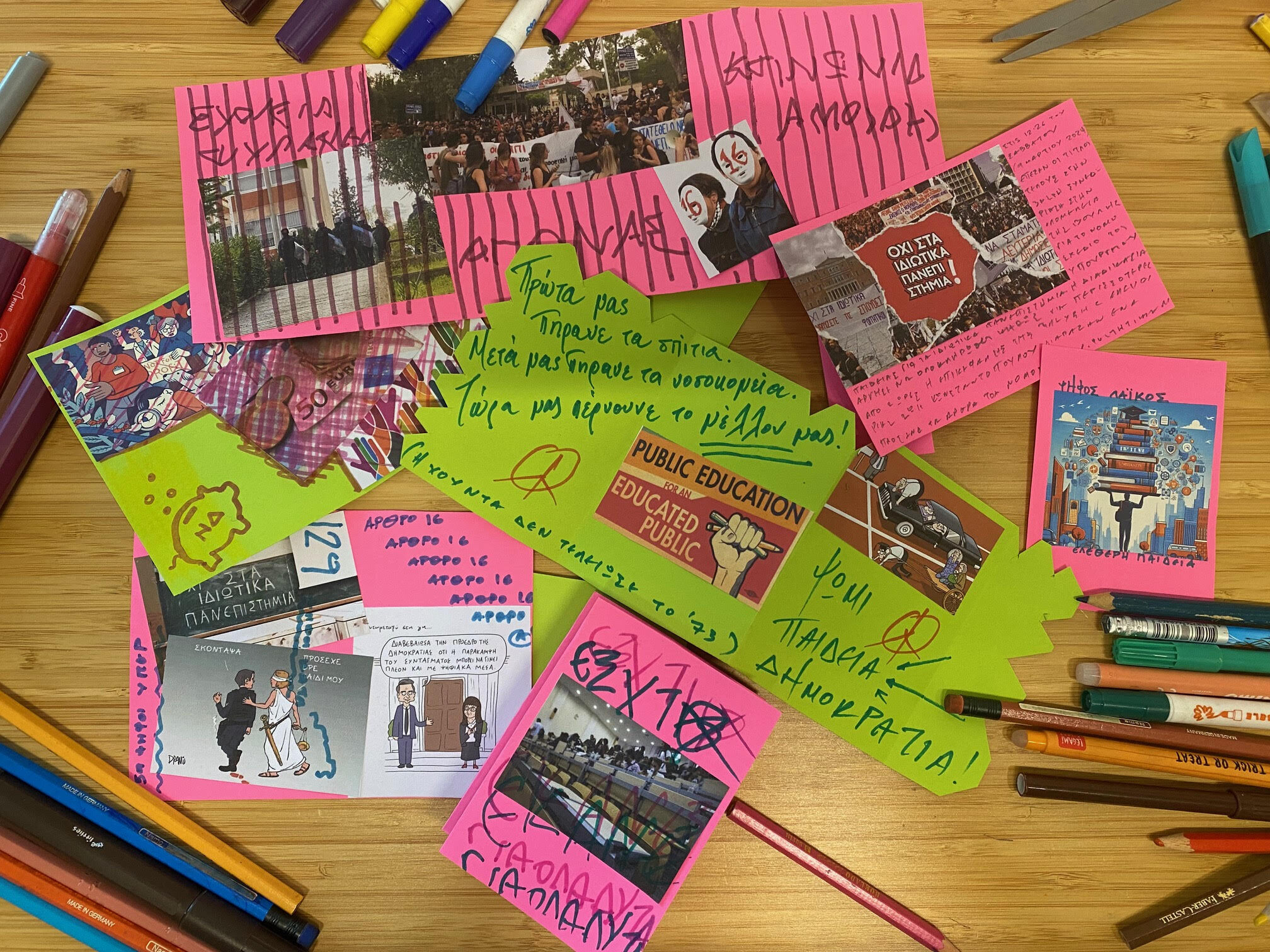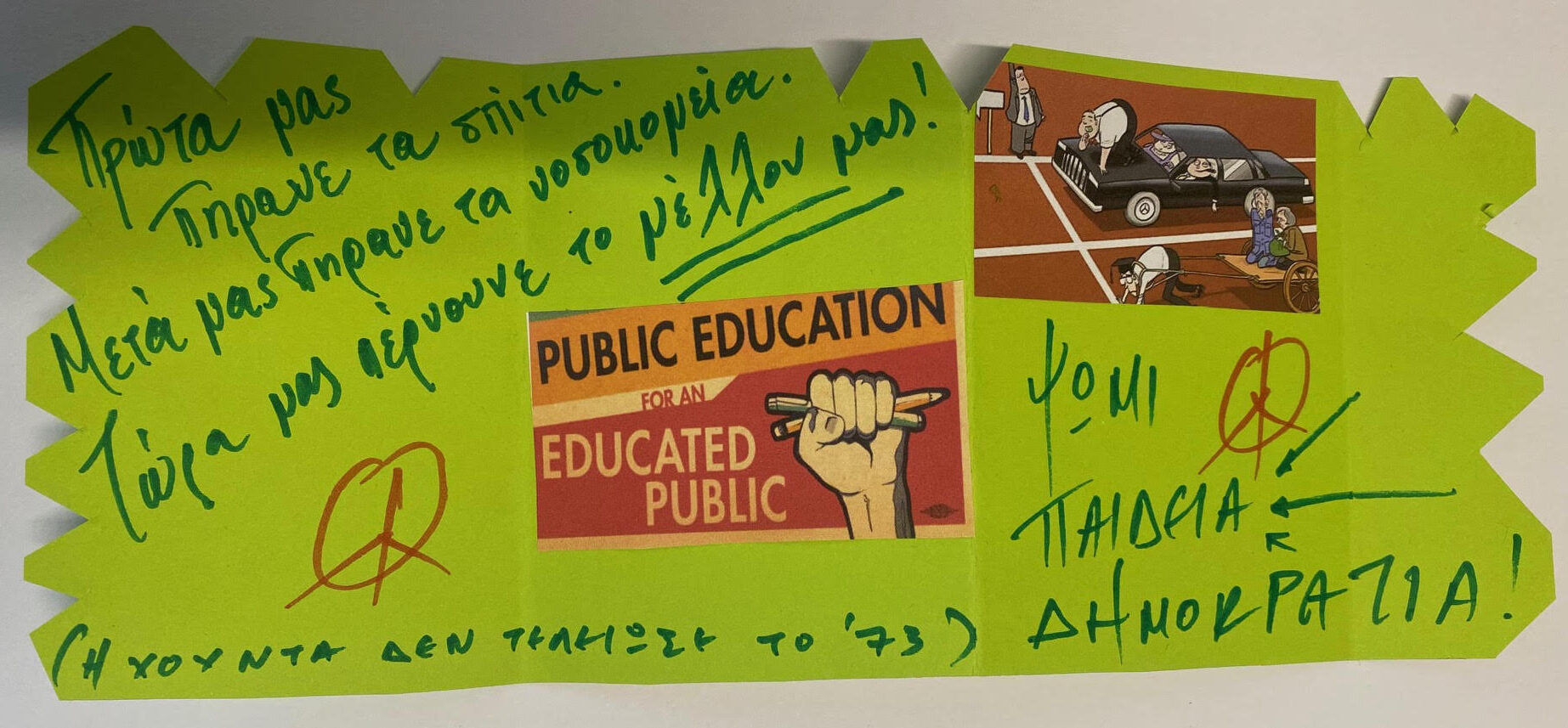LATRA’s CCLab developed around the theme of ‘Democratisation of Education’, where we examined the newly introduced legislation for allowing the emergence of private universities across Greece. During our CCLab we worked with diverse members of the student body to examine this issue through the lens of civic participation by students and how they understand and react (positively or negatively) to these policies. At the same time, we looked at the impact of these policies on the local communities that host universities and how these measures relate to them as well as the dynamics built between students and communities.
The CCLab’s focus on the privatisation of universities and its impacts on marginalized students aligns with LATRA’s mission of promoting equitable inclusion and empowering disadvantaged communities. LATRA’s experience with NEETs, refugees, and marginalized youth informed the CCLab’s participatory action research approach, ensuring a grounded understanding of challenges.
An approach firmly rooted in real-world impacts
During the CCLab we engaged with various stakeholders, including students, educators, and community members, to identify pressing issues in the education sector. Feedback indicated significant concern around the trends of privatisation and increased campus security measures.
These consultations helped identify the critical intersections between education, equity, and community impact. Together with the participants, we conducted research to gather data on the effects of privatisation and security measures in higher education. This evidence-based approach ensured that the chosen topic was rooted in real-world impacts and trends. By examining best practices and case studies from other regions and institutions, LATRA identified key areas where intervention and research could drive meaningful change.
To produce the CCLab, LATRA collaborated with local civil society organizations that were chosen due to their active involvement in youth work, research, and education within the local community. The labs were designed to foster interactive and collaborative learning environments, encouraging active participation and dialogue among students and facilitators. Emphasis was placed on understanding and reacting to policies, promoting civic participation, and empowering students to advocate for their educational rights.
Working with creative tools
The CCLab utilized a combination of dynamic governance, participatory decision-making, and creative tools such as zines to foster an inclusive and interactive environment. These methods emphasizes equality, transparency, and the ability to adapt to changing circumstances. Zines were used as a creative tool to allow participants to express their thoughts, experiences, and ideas in a tangible format. This method encouraged creativity and personal expression, helping to capture the diverse perspectives of the participants.
Participants appreciated the inclusive and participatory nature of the sessions. They valued the opportunity to voice their opinions and contribute to discussions on important issues. The methods used, were effective in engaging students and making them feel part of the process.
Learnings & feedback
The use of zines as a creative outlet was well-received. Participants enjoyed the hands-on activity and found it a unique way to express their thoughts and ideas. Incorporating more creative tools and activities in future sessions can enhance engagement and provide diverse ways for participants to express themselves.
Some participants expressed a desire for more interactive and collaborative activities, suggesting that sessions could include more group work and interactive discussions. Increasing the amount of interactive elements in the sessions, such as breakout groups and collaborative projects, can improve participant engagement and satisfaction.
The diversity of the cohort brought a wide range of perspectives and insights, enriching the discussions and outcomes. This highlights the importance of maintaining a diverse participant group in future cycles.
The sessions revealed a strong potential for student-led advocacy and change. Participants demonstrated a keen interest in taking the findings and recommendations forward, indicating the labs’ role in fostering future leaders and advocates. Participants may benefit from ongoing support and follow-up activities to help them implement the ideas and actions discussed in the labs. Creating a support network or alumni group could help sustain engagement and momentum.
Join our newsletter to continue to be updated on what we’re up to at #CriticalChangeLab. We’ll always keep it interesting, and only send you updates for as long as you want us to.




